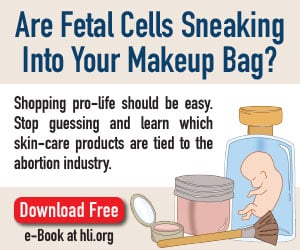Abortion Is a Preeminent Issue in Midterm Elections
The 2022 midterm elections in the U.S. are shaping up to be the most important elections on the bioethical issues concerning the dignity of human life in living memory, specifically preborn life.
This is hardly surprising, given the Supreme Court’s decision earlier this year to reverse Roe v. Wade. So long as Roe was the law of the land, individual states were severely hampered in what laws they could pass to restrict abortion. With Roe cleared out of the way, states are now free to pass all sorts of laws protecting preborn life.
Naturally, this has galvanized people on both sides of the issue. Pro-life politicians and citizens are jumping at the opportunity to pass laws protecting more preborn children from the violence of abortion. However, on the flipside pro-abortion strategists are seeking every available opportunity to tighten, or expand, pro-abortion laws in liberal states, particularly in light of a recent report that sixty-six abortion facilities have ceased performing abortions since Roe was reversed.
As the New York Times put it in a recent analysis, with Roe gone “every election has implications for [abortion] access.” That same analysis notes that voters in at least seven states are set to vote on ballot initiatives or in governor or legislative races that could have massive implications for abortion.
Important Initiatives and Races
In several states, voters will have the opportunity to vote on critical ballot initiatives, some pro-abortion and some pro-life.
In California, Michigan, and Vermont, voters will be asked on whether to place the “right” to abortion, on demand, into the state constitutions.
In California, voters will vote on Proposition 1, a profoundly destructive constitutional amendment that would prohibit state legislators from passing any pro-life legislation. As the state’s official summary reads, Proposition 1 would amend the state constitution, “to expressly include an individual’s fundamental right to reproductive freedom, which includes the fundamental right to choose to have an abortion and the fundamental right to choose or refuse contraceptives.”
In summarizing the arguments against Proposition 1, the state’s voter guide website states, “Proposition 1 is an extreme law that allows late-term abortions at taxpayer expense up to the moment of birth—even if the baby is healthy and the mother’s health is not threatened. Current California law already guarantees a woman’s right to choose, making this extreme and costly proposal unnecessary.”
This is a breathtakingly extreme amendment that would make it impossible for California legislators to pass even the mildest abortion restrictions. If passed, Prop 1 would radically change health care policy by giving even more power to politicians. It poses an existential threat to untold thousands of preborn children every year.
The California Conference of Bishops, since day one, have been very vocal in their opposition to Proposition 1:
[The Conference] vehemently opposes Proposition 1 (SCA 10), which looks to enshrine the most extreme forms of abortion into the California Constitution. We believe in protecting life at every age in every stage.… Enshrining this amendment’s language into the constitution will extend the danger of coercive abortion to babies with unquestioned viability.
In response to this grave threat, the bishops are calling upon the state’s 12 million Catholics “to work to raise awareness and vigorous opposition.” Prop 1 must be defeated!

In Michigan, voters will be voting on Proposal 3, which would affirm a “constitutional right” to “reproductive freedom,” which the proposal defines as “the right to make and effectuate decisions about all matters relating to pregnancy, including but not limited to prenatal care, childbirth, postpartum care, contraception, sterilization, abortion care, miscarriage management, and infertility care.” Pro-life citizens must vote no to this proposal.
Similarly, in Vermont, an affirmative vote on Proposal 5 would insert a “right” to “personal reproductive autonomy” into the constitution. Once again, be sure to vote no!
In Kentucky, meanwhile, voters will be asked to vote on Amendment 2, which would make it clear that there is nothing in the state constitution that creates a right to abortion. In other words, a “yes” vote would protect the ability for pro-life lawmakers to pass laws protecting the lives of unborn children.
Meanwhile, in Montana voters will weigh in on Montana LR-131, the Medical Care Requirements for Born-Alive Infants Measure. This measure makes clear that children that are born alive, even if after an attempted abortion, are legal persons and must be provided with medical care.
In their analysis, the New York Times also highlighted state-level races in North Carolina, Pennsylvania, Wisconsin, and Kansas as being of immediate critical importance for abortion rights. In Kansas, a ballot initiative that would have overturned a state Supreme Court decision protecting abortion was rejected a few months ago. However, six of the seven supreme court justices are up for re-election. If voters reject the justices, that will open up the possibility of whoever wins the governor’s race for appointing pro-life justices who can overturn the pro-abortion ruling.
In North Carolina, meanwhile, Democrat Gov. Roy Cooper has consistently vetoed pro-life legislation. However, with just a few more seats, Republicans could hold a veto-proof majority, ensuring that they can pass laws protecting the unborn without having to worry about a governor’s veto.
In Pennsylvania, we find a similar situation, with another Democratic governor, Tom Wolf, having vetoed pro-life laws in the past. If the Republican candidate, Doug Mastriano, wins, it is likely that the legislature will pass pro-life laws that will go into effect without being vetoed.
And finally, in Wisconsin Republicans are looking to win a veto-proof majority, which could result in the states’ near-total abortion ban (which the current governor has sued to block) to stay in effect.
At the federal level, of course, Democrats are hoping to win a majority in the Senate and the House, and perhaps try to pass the so-called “Women’s Health Protection Act,” which is one of the most-extreme pro-abortion pieces of legislation ever. This is why it is so crucial that pro-life voters show up in a big way and pull the lever for pro-life candidates in their districts.
Democrats Try to Mislead
In the leadup to the midterms, Democrat strategists have been working to turn people’s attention away from the dismal state of the economy, and keep it focused firmly on the issue of abortion. They believe that by painting Republicans as “extremists” on the issue of abortion in the wake of the reversal of Roe, they can distract from the failures of this administration on a host of other issues. To that end, they have spent over $124 million on abortion-related advertising.
Besides the fact that this is likely a losing strategy (even the super pro-abortion Daily Beast thinks so!), the only way that they can accomplish this is through misleading tactics. Take, for instance, the response to Sen. Lindsey Graham’s highly imperfect proposed bill to ban abortion after 15 weeks. Democrats and the pro-abortion media have attempted to portray this as an “extreme” pro-life bill. In reality, most European nations, including the most liberal nations, actually have abortion laws that are more restrictive than Sen. Graham’s bill, often only allowing abortion in the first 12 or 13 weeks.
If anything, then, Sen. Graham’s bill exposes how extreme the Democrats are, and how extreme abortion law under Roe was! Whereas practically every government in Europe, no matter how liberal, acknowledges that the preborn child is deserving of protection at some point, Democrats in the U.S. want abortion-on-demand, paid for with tax dollars, up to birth!
Maybe that’s why in their petition against the bill, Planned Parenthood misleadingly calls it a “nationwide abortion ban.” Nowhere do they clarify that this “nationwide abortion ban” would in fact allow abortions through the first 15 weeks! (The same is true of the longer article on their website about the bill.) And maybe that’s because they know that even many self-described “pro-choice” Americans in fact support restrictions, recognizing that the preborn child must be protected at some point. So, they have to lie and dissemble.
This is how Republicans and pro-life activists must reframe this debate and this election. For decades, under Roe, the U.S. was an outlier, allowing abortion up to the point of viability, with no meaningful restrictions. In this election, it’s not just that we have a party and an administration that have grossly mismanaged things like the economy and the pandemic, but we have a party and administration who think that their main winning issue is to promote more killing of preborn children, or to push the already insane LGBT/gender conversation even more towards progressive lunacy.

Catholic Teaching and Call to Action
In Forming Consciences for Faithful Citizenship, the United States Conference of Catholic Bishops (USCCB) say that voting is an important conscientious decision. They remind Catholics that “our approach to contemporary issues is first and foremost rooted in our identity as followers of Christ and as brothers and sisters to all who are made in God’s image.” Here, they stress to
all Catholics, including those seeking public office, [that] our participation in political parties or other groups to which we may belong should be influenced by our faith, not the other way around.
The bishops also reaffirm their opposition to the violence and crime of abortion, stating,
the threat of abortion remains our preeminent priority because it directly attacks life itself, because it takes place within the sanctuary of the family, and because of the number of lives destroyed.
And they make it perfectly clear that
the direct and intentional destruction of innocent human life from the moment of conception until natural death is always wrong and is not just one issue among many [emphasis added]. It must always be opposed.
Abortion is a preeminent issue, one that surpasses all others: it involves an intentional act by parents and heath care professionals to deliberately destroy the lives of totally innocent preborn children.
As an intrinsic evil, abortion is never permitted or morally justified, regardless of individual circumstances or intentions. And abortion is distinct from other social ills because the innocent child in the womb has no legal protection.
The teaching of the Catholic Church on this issue could not be any clearer. For Catholics, it is one of the few crimes under Canon Law that is sanctioned with a latae sententiae or automatic excommunication:
Qui abortum procurat, effectu secuto, in excommunicationem, latae sententiae, incurrat” – Those who successfully abort a living human fetus bring on themselves instant excommunication (Canon no. 1398).
Qui abortum procurat means anyone who works to kill a preborn child. This deliberate act not only involves the abortionist, but it also includes other actors – i.e., the boyfriend or husband who drives / escorts the mother to the abortion facility, pays for the abortion in full or in part, or even advises that abortion may be an option in her case. Latae sententiae means that the person brings instant excommunication upon himself or herself with their freely chosen act. This sanction also applies to the abortionist, attending nurse or counselor, and anyone else who assists in the abortion.
In the case of a latae sententiae penalty attached to an offence, accomplices, even though not mentioned in the law or precept, incur the same penalty if, without their assistance, the crime would not have been committed… (Canon no. 1329).
In its document Doctrinal Note on Some Questions Regarding the Participation of Catholics in Political Life, the Vatican’s Congregation for the Doctrine of the Faith highlights the serious nature of our approach, as well as obligation to put the dignity of the human person at the center of our political commitment, reminding Catholics that
a well-formed Christian conscience does not permit one to vote for a political program or an individual law which contradicts the fundamental contents of faith and morals (no. 4).
Certainly, the stakes this November couldn’t be higher. Pro-abortion Democrats and advocates for abortion are hoping to win enough seats on both state and federal levels to enshrine abortion “rights” into law, and to stop pro-life state legislatures from passing pro-life laws, or from allowing those laws to go into effect. It is critical that Catholics and committed pro-life Americans show up to the polls and volunteer their time to get out the vote for pro-life initiatives and candidates.
Lives depend on it!
As president of Human Life International, Fr. Boquet is a leading expert on the international pro-life and family movement, having journeyed to nearly 90 countries on pro-life missions over the last decade. Father Boquet works with pro-life and family leaders in 116 counties that partner with HLI to proclaim and advance the Gospel of Life. Read his full bio here.








[…] momentum elsewhere in the country by doubling down on their radical pro-abortion position. As I wrote last week, in the upcoming election California voters will be asked to vote on Proposition 1, a ballot […]